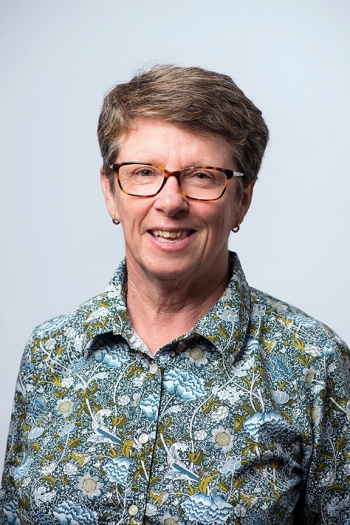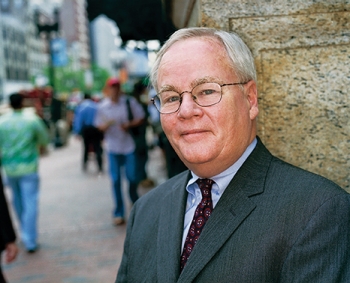
By
Words and phrases matter a lot in the refugee crisis that has roiled Europe and the Middle East, according to Boston College faculty members.
For example, the word “refugee” itself carries critical legal weight – as opposed to “migrant,” which though sometimes used interchangeably with “refugee” by the media is a more ambiguous, and even controversial, term.
For Jesuit Refugee Service Australia Associate Director Maryanne Loughry, RSM, an adjunct faculty member in the BC School of Social Work (BCSSW), the very phrase “refugee crisis” – also a pervasive meme – is problematic.
“It’s really a ‘conflict crisis,’” says Sister Loughry, who has worked for JRS since 1987. “The refugees aren’t the crisis, it’s the bombing, the torture, the destruction. That’s what has been mainly fueling this unprecedented movement of people.”
But also troublesome, Sister Loughry and other BC experts in humanitarian issues say, are the narratives that have formed, whether via the media, the political arena or public opinion. Throughout Europe and the United States, compassion and empathy for the refugees’ plight duel with suspicion, resentment and fear – sparked by misperceptions and misunderstandings – according to the faculty, who point out that there are similar crises taking place in other parts of the world.
Even as attention tends to focus on the more immediate and sensationalistic aspects of the refugee situation, humanitarian experts – including those affiliated with BC – are seeking answers for the longer-term effects of displacement, such as housing, education and employment.
Sister Loughry pointed to BC’s Center for Human Rights and International Justice (CHRIJ) and the BCSSW Immigrant Integration Lab as examples of the University’s efforts to address big-picture issues involving refugees – a fitting task for a Jesuit, Catholic institution. In addition, she noted, BCSSW students have frequently interned for the JRS, and BCSSW Associate Professor Thomas Crea is working with a pilot program to make higher education accessible to populations living in refugee camps through an online platform.
“Most news coverage has involved the photos and videos of the people moving from the Middle East to Europe, all the obstacles and hardships they’ve been experiencing, and what may lie ahead for them,” says Sister Loughry. “But there are many compelling aspects to this story that aren’t fully appreciated. For example, about half of Syria’s population is displaced – not only the approximately 4.1 million people who have fled the country, but the 7.6 million who are still inside the country.
“Meanwhile, Afghans and Eritreans also are part of the exodus to Europe, thousands upon thousands of Iraqis are displaced – within Iraq or elsewhere in the Middle East – and South Sudanese are moving into Uganda to escape the conflict with Sudan. There are as many as 60 million people displaced worldwide: What does the future hold for them?”
As University Professor for Human Rights and International Justice David Hollenbach, SJ, and the other faculty experts see it, part of the answer to that question lies in acknowledging the diversity of the displaced populations, rather than viewing them as one faceless, uniform mass, and grasping the legalities of the refugee situation.
“People who are refugees have the right to protection and asylum; it’s not ‘a nice thing’ that someone decides to give to them,” says Fr. Hollenbach, the CHRIJ director. “This is codified by an international treaty that’s been in place for more than 60 years, one to which the US agreed and is obligated to uphold.”
Unfortunately, say faculty members, media, political and public discussions invariably lump refugees with those persons classified as migrants – who do not have the same protections or rights as refugees – and with illegal immigrants. Also troubling, they add, is a tendency to apply a catch-22 to refugees: In this either-or view, the refugees are unskilled and uneducated, and hence sure to be a drain on societal resources; or, if they do have some means (such as cellphones, GPS devices or other technology), they are somehow “undeserving” of assistance.

“Syria is not a developed country on the same level as the US, but – at least until now – it’s not desperately poor,” says Fr. Hollenbach. “So, while not all Syrians might have cellphones, most do have education and resources. In any case, I think we need to be careful about dwelling too much on the refugee-versus-migrant argument, and operating under the perception that there’s an open-and-shut case to be made on defining a person in economic terms.”
The current refugee situation is widely described as the worst since that of World War II, but BC faculty experts say comparisons between the two are elusive – especially in the way both have been depicted and perceived. World War II-era refugees, who were mostly of European origin, were supposedly regarded with more compassion because they were viewed as fleeing repressive regimes: first that of Nazi Germany and then Communist Russia. The narrative for today is different, in large part because most of the refugees are not from European countries, nor are they Christian.
Says Sister Loughry, “Now, there are many voices saying these aren’t refugees at all, but illegal immigrants or – even worse – terrorist cells bent on destroying Western civilization.”
Post-9/11 anxiety about radical Islamism has sparked this attitude, particularly in the US, but screening procedures for refugees are quite thorough, according to Sister Loughry, who discussed the issue at a campus forum on the Syrian refugee situation held last week by CHRIJ.
“I’ve been in the screening rooms for refugees,” she told the audience. “There are in fact two screenings, one when the refugees leave, and another when they enter the US. The risk of someone from ISIS or other such organization or movement coming here is incredibly remote.”
Speaking at the same event, BCSSW Associate Professor of Micro Practice Westy Egmont – director of the Immigrant Integration Lab – recalled past refugee resettlements in the US in the wake of conflicts such as Indochina and Kosovo. He said the US, despite fears to the contrary, would be able to handle the increased number of Syrian refugees announced by Secretary of State John Kerry.
“We have a program that works,” he said.
Egmont also said collaborative efforts through the European Union and the United Nations – plus a more “robust funding” of the UN’s food program – would be critical to addressing the refugees’ plight.
Sister Loughry and Fr. Hollenbach – who say it is critical for the US to work with Russia, and other regional powers, on a political solution for Syria – hope the generally enthusiastic response Pope Francis received during his US visit will inspire compassion toward the world’s refugees.
“Pope Francis has spoken continually about reaching out to the marginalized, the unfortunate, so hopefully that message will resonate,” says Sister Loughry.



